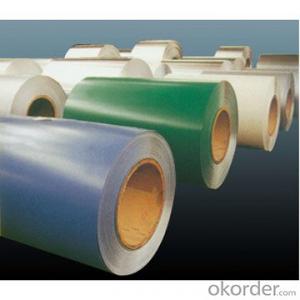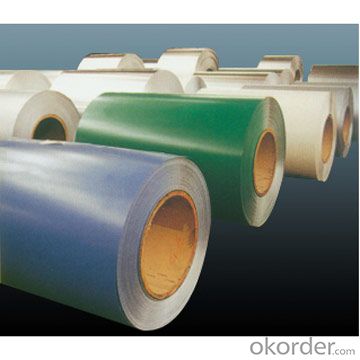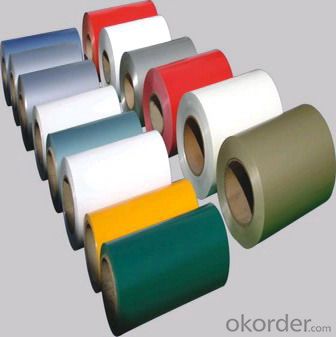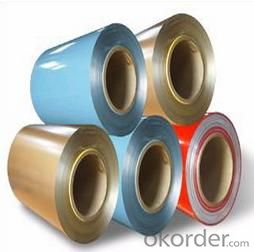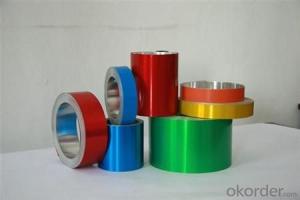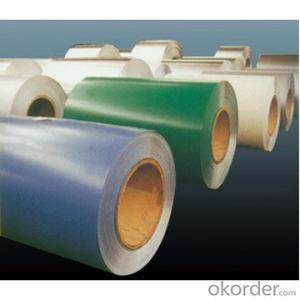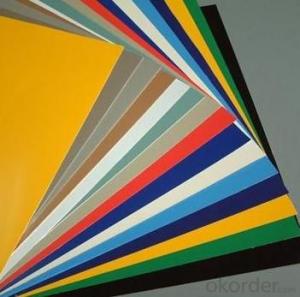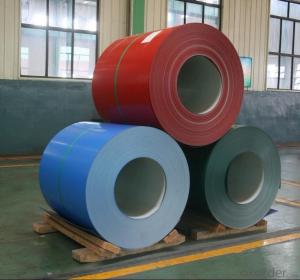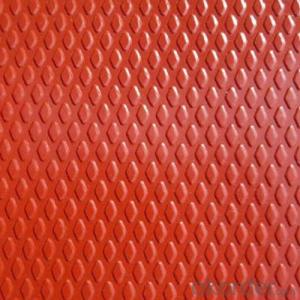5052 Aluminum Coil Price - Prepainted Alu Coil for Any Application
- Loading Port:
- China Main Port
- Payment Terms:
- TT OR LC
- Min Order Qty:
- -
- Supply Capability:
- -
OKorder Service Pledge
OKorder Financial Service
You Might Also Like
Aluminium alloys with a wide range of properties are used in engineering structures. Alloy systems are classified by a number system (ANSI) or by names indicating their main alloying constituents (DIN and ISO).
The strength and durability of aluminium alloys vary widely, not only as a result of the components of the specific alloy, but also as a result of heat treatments and manufacturing processes. A lack of knowledge of these aspects has from time to time led to improperly designed structures and gained aluminium a bad reputation.
One important structural limitation of aluminium alloys is their fatigue strength. Unlike steels, aluminium alloys have no well-defined fatigue limit, meaning that fatigue failure eventually occurs, under even very small cyclic loadings. This implies that engineers must assess these loads and design for a fixed life rather than an infinite life.
Another important property of aluminium alloys is their sensitivity to heat. Workshop procedures involving heating are complicated by the fact that aluminium, unlike steel, melts without first glowing red. Forming operations where a blow torch is used therefore require some expertise, since no visual signs reveal how close the material is to melting. Aluminium alloys, like all structural alloys, also are subject to internal stresses following heating operations such as welding and casting. The problem with aluminium alloys in this regard is their low melting point, which make them more susceptible to distortions from thermally induced stress relief. Controlled stress relief can be done during manufacturing by heat-treating the parts in an oven, followed by gradual cooling—in effect annealing the stresses.
The low melting point of aluminium alloys has not precluded their use in rocketry; even for use in constructing combustion chambers where gases can reach 3500 K. The Agena upper stage engine used a regeneratively cooled aluminium design for some parts of the nozzle, including the thermally critical throat region.
Another alloy of some value is aluminium bronze (Cu-Al alloy).
Aluminium foil acts as a total barrier to light and oxygen (which cause fats to oxidise or become rancid), odours and flavours, moistness, and germs, it is used broadly in food and pharmaceutical packaging. The purpose of aluminium is to make long-life packs (aseptic processing|aseptic packaging) for drinks and dairy goods, which allows storing without refrigeration. Aluminium foil containers and trays are used to bake pies and to pack takeaway meals, ready snacks and long life pet foods.
Aluminium foil is widely sold into the consumer market, often in rolls of 500 mm (20 in) width and several metres in length.It is used for wrapping food in order to preserve it, for example, when storing leftover food in a refrigerator (where it serves the additional purpose of preventing odour exchange), when taking sandwiches on a journey, or when selling some kinds of take-away or fast food. Tex-Mex restaurants in the United States, for example, typically provide take-away burritos wrapped in aluminium foil.
Aluminium foils thicker than 25 μm (1 mil) are impermeable to oxygen and water. Foils thinner than this become slightly permeable due to minute pinholes caused by the production process.
- Q: What is the corrosion resistance of aluminum coils in saltwater environments?
- Aluminum coils have excellent corrosion resistance in saltwater environments. This is due to the formation of a protective oxide layer on the surface of the aluminum, which acts as a barrier against corrosion. This oxide layer prevents the saltwater from coming into direct contact with the aluminum, effectively reducing the risk of corrosion. Additionally, aluminum is inherently resistant to saltwater corrosion because it is a relatively inert metal. As a result, aluminum coils are commonly used in various marine applications, such as boat hulls, offshore structures, and saltwater cooling systems. However, it is important to note that prolonged exposure to saltwater can still result in some level of corrosion over time. Regular maintenance and appropriate protective coatings can help enhance the longevity and performance of aluminum coils in saltwater environments.
- Q: Are there any environmental considerations when using aluminum coils?
- Yes, there are several environmental considerations when using aluminum coils. Firstly, the production of aluminum coils requires mining and extraction of bauxite, which can lead to habitat destruction and biodiversity loss. Additionally, the extraction and refining processes consume significant amounts of energy, contributing to greenhouse gas emissions. However, aluminum is highly recyclable, and using recycled aluminum reduces the environmental impact by saving energy and reducing waste. Proper disposal and recycling of aluminum coils are crucial to minimize environmental harm.
- Q: If so why does an aluminum bend or get nicked or break quickly?
- NO! You should ask yourself why Tank built with steel rather than using aluminum.
- Q: Can aluminum coils be used in the production of aluminum ceilings?
- Yes, aluminum coils can be used in the production of aluminum ceilings. Aluminum coils are commonly used in the manufacturing of various aluminum products, including aluminum ceilings. These coils are typically made from high-quality aluminum alloy, which is then processed and formed into coils of the desired thickness and width. The coils can be easily cut and shaped into the desired dimensions for the ceiling panels. Additionally, aluminum is a lightweight, durable, and corrosion-resistant material, making it an ideal choice for ceilings. It is also highly versatile, allowing for a variety of finishes and designs to be applied to the aluminum surface, further enhancing the aesthetic appeal of aluminum ceilings. Overall, aluminum coils are a key component in the production of aluminum ceilings, providing a reliable and long-lasting material for these types of applications.
- Q: why do we use copper more than aluminum? give some characteristic of copper that makes it better then aluminum?
- Unless you have a specific purpose in mind, I don't think copper is used as much as aluminum. Aluminum was used in house wiring for a short time because it is less expensive than the usual copper, but something about it caused house fires. (I think it was thermal expansion caused connections in switches to loosen creating connections that would heat up, or spark.) Copper is preferred for house wiring. Copper is about 3 times more dense, so Al is used where light weight is a consideration. I can't remember the last time I drank something out of a copper can.
- Q: Are aluminum coils suitable for high-temperature roofing applications?
- No, aluminum coils are not suitable for high-temperature roofing applications. While aluminum is a durable and corrosion-resistant material, it has a relatively low melting point compared to other metals commonly used in roofing, such as steel or copper. Aluminum has a melting point of around 660 degrees Celsius (1220 degrees Fahrenheit), which is much lower than the temperatures that can be reached on a hot roof during summer or in areas with high ambient temperatures. Therefore, using aluminum coils for high-temperature roofing applications could lead to the material warping, distorting, or even melting under the excessive heat, resulting in structural damage and potential leaks. It is advisable to use materials with higher melting points, such as steel or copper, for roofing applications where high temperatures are a concern.
- Q: Today at my school I was messing with this sketch thingy, the one with 2 knobs to twist up or down to draw, my friend decided to break it and when we broke it, this silver dust called aluminum powder got on my hands, I never knew it was dangerous cause your see, we never read the manual we just found it. About 3 minutes later he pointed to my hand and I saw blood. It kinda stung.
- The aluminum powder found in an Etch-a-Sketch will not cut you, it's much too small. In fact it's so small you could only see it's edges under a high powered microscope. The cut was most likely caused by jagged glass/plastic when you broke the Etch-a-Sketch open. It's not unusual to cut yourself and not realize until someone else sees you're bleeding.
- Q: what is the hardness number of aluminium.....? what is the hardness number of aluminium-Sic composite material...?
- I don't believe that Aluminum (US spelling)/ Aluminium (UK spelling) has a Mohs Hardness rating. The Hardness of a material, as measured by the Mohs Hardness scale, is a criterion of its resistance to crushing. [Perry's Chemical Engineering Handbook]. Since aluminum is a metal, and would deform under a crushing-type stress, rather than shatter, it would not have a Mohs Hardness rating. Perhaps you meant **aluminA**, rather than aluminum. Alumina (Al2O3) has a Modified Mohs Hardness of 12. Silicon Carbide (carborundum) has a Modified Mohs Hardness of 13. There's no value listed for the combination, but it should be pretty hard stuff -- likely in the 12-13 range, but potentially even harder. Hope that helps.
- Q: What is the reflectivity of aluminum coils?
- The reflectivity of aluminum coils refers to the ability of these coils to reflect light. Aluminum is known for its high reflectivity, with a reflectivity percentage of approximately 80-90%. This makes it an ideal material for various applications where reflective properties are desired, such as in the manufacturing of mirrors, solar panels, and lighting fixtures. The high reflectivity of aluminum coils allows for efficient light reflection, minimizing energy loss and maximizing the performance of these applications.
- Q: Are aluminum coils suitable for electrical transformer applications?
- Yes, aluminum coils are suitable for electrical transformer applications. They offer several advantages such as lower weight, better thermal conductivity, and cost-effectiveness compared to copper coils. Additionally, aluminum coils have good electrical conductivity and can withstand high temperatures, making them a viable option for transformer applications.
Send your message to us
5052 Aluminum Coil Price - Prepainted Alu Coil for Any Application
- Loading Port:
- China Main Port
- Payment Terms:
- TT OR LC
- Min Order Qty:
- -
- Supply Capability:
- -
OKorder Service Pledge
OKorder Financial Service
Similar products
Hot products
Hot Searches
Related keywords
